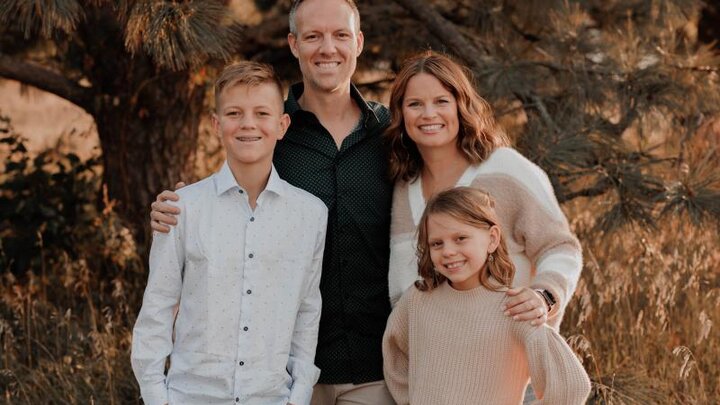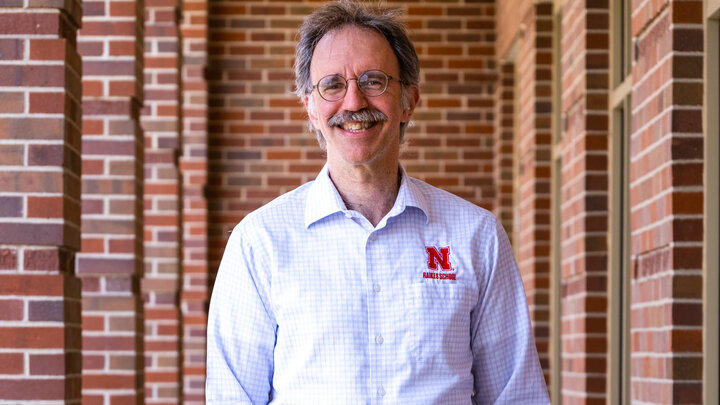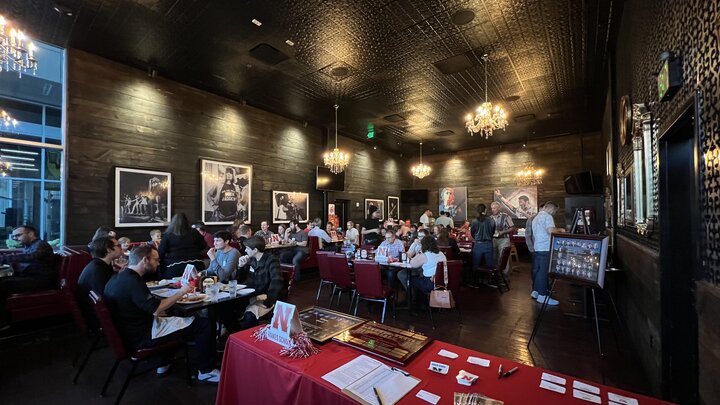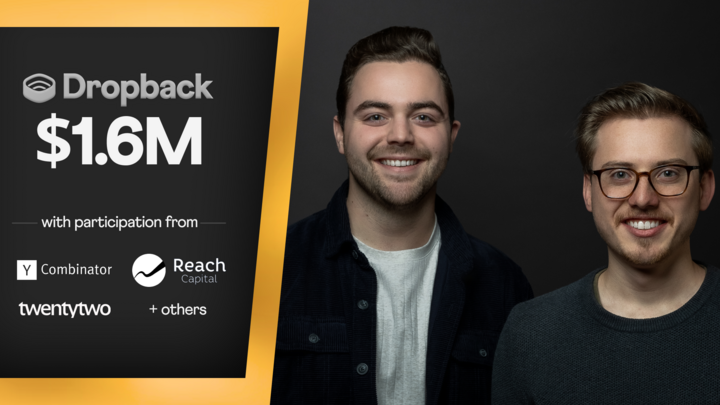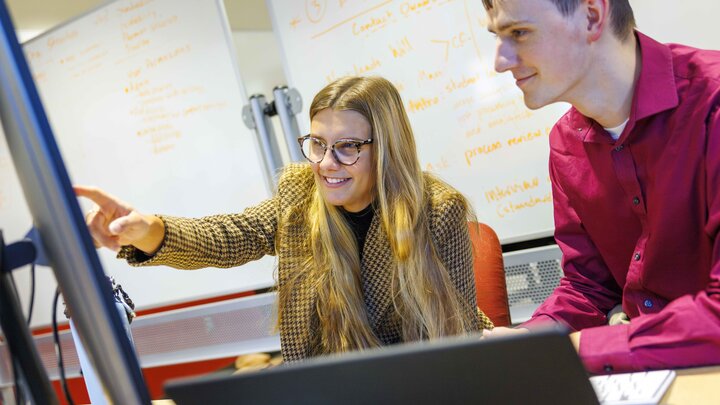The Raikes School caught up with Matt Mueller, Raikes School alumnus and current Chief Operating Officer at Hudl. Matt also recently joined the Raikes School's Corporate Advisory Board. Matt obtained a Bachelor of Science in Computer Science in 2005 followed by his MBA through the Raikes School in 2006.
Can you tell us a bit about yourself?
I grew up in a lot of places, but San Antonio is where I spent most of the time growing up. My parents started private schools so they would get called by Lutheran churches. I always joke I had the entrepreneurial spirit kind of built into me from an early age, building something from scratch. We moved to Omaha in the middle of high school, and I graduated from Elkhorn High School. I ended up at Nebraska and the Raikes School, the JD Edwards Honors Program back then. I was part of the first freshman class that lived in the Kauffman Center. On the first day of move-in, I met John Wirtz and Brian Kaiser. On the first day of college, I met David Graff, Brian Fleissner, and a whole heap of Hudl employees through my time in the Raikes School, and we've been stuck together ever since.
I met my wife before college but got married right after graduating with my MBA. I then took a job at a company called National Instruments in Austin, TX. I got to do a lot of great things there, learned a lot, and brought a lot of lessons into Hudl even in my short time there. I was there a few weeks and John knocked on my door and said you have to come back. After some back and forth, they shipped me a computer so during the day I worked my job at NI and at night I would code for Hudl. Jokingly, I was the first remote employee, but I was working at night when no one else was working. I then had a choice to become a bigger part of National Instruments or come back to Hudl. My wife is a teacher, so we finished up the year and moved back to Nebraska, and officially in July 2007, I joined Hudl.
I've been married now 17 and a half years; I have two dogs and two kids. My son is 14 and a freshman at Lincoln Lutheran, plays soccer. My daughter is 10 and in fifth grade, and she decided this year to switch from gymnastics to club soccer, so I'm soccer dad when I'm not at work. I joke that I don't have hobbies, I just drive around in my car. In October, my son's soccer team won Nebraska State Cup, my daughter won a soccer tournament, my wife won Nebraska Tennis Player of the Year, and I crossed 100,000 miles on my Tahoe. I'm on the Junior Achievement of Lincoln's Executive Board and really believe in giving back to the community in a different way. I love talking to kids about opportunities that exist in a career. The world is so much bigger than I think a lot of kids get, so being able to talk about entrepreneurship and career opportunities, and just set them on the right path is exciting.
Can you talk about what it's been like to be part of the early days of Hudl and witnessing the company's growth over the years?
I started as an engineer in 2007 and have since helped build and scale just about every job. I've built our support department, scaled our sales department from the ground. David and I joke that he was sales rep #1 and I was support rep #1, and maybe the reason we didn't grow that fast is because we weren't very good sales and support reps. I then worked in marketing, scaled our operations team, and eventually transitioned into more of a general manager role. You can oversimplify my current job as COO as a mix of working with leaders to make sure we achieve our objectives for the day, like revenue strategy and profitability objectives, and spend a lot of time working on what the next 5 to 10 years of Hudl look like. I have a good overview of Hudl from the ground up and top down, working in and thinking about the strategy and global perspective.
We'll be celebrating 20 years of Hudl in 2026, which feels right around the corner. We look back all the time, not as nostalgia but more like ‘what can we learn from?' Are there things that we did back then that we were really great at that we should bring back? I think as a lesson, sometimes when you hit a really frustrating moment, you look back and we were complaining about this thing. And that's such a small thing that we never even think about anymore. The biggest irony is our team forces us to grow. We just opened our Barcelona office and people will ask us all the time, ‘did you ever think about opening a Barcelona office?' Honestly, no!
The plan was to really dominate football, maybe move into basketball, then baseball, maybe we take on the MLS. After we've done all of that and really nailed all professional sports and college in the US, maybe we think about growing internationally. High school was never on the radar, international was like a pipe dream out in the future. I don't think we really understood what we were saying in 2006, 2007. To see where we are today, I think it's pretty incredible to reflect on that journey. To have the team we built around the world is a lot of fun and better than anything we imagined. We're now over 4,000 employees globally in about 18 different countries.
Over the course of your career, is there anything that stands out among successful projects or teams you've been part of?
There are so few days in your life that you will get to say ‘wow, I changed this industry or this world in a very unique way.' I think in 2009, the launch of hudl.com really changed the way sports video was used at just about every level. You have to reset your brain to 2008, 2009 but just having the internet as a tool to share sports video specifically for recruiting completely changed access and availability for everyone; up until that point it was very expensive. Coaches and players were not tech experts, so what that meant for accessibility was huge. Over the course of four years, we went from zero high schools to 75% market share, which meant 75% of high school kids in the nation suddenly had the ability to get recruited in a different way. It changed college recruiting because now it's no longer DVDs, it was Hudl tape. 100% of college football teams use Hudl for recruiting. When we saw the usage around 2013 or 2014 – that moment was unreal.
I think we're on the precipice of it again with automated capture. It's tough to film a soccer game from any vantage point that makes sense. It's tough to find somebody to film, and automated capture is going to change that world completely. A connected system that allows you to capture video, automatically identify players on the pitch, field, or court, then share that into a global recruiting system and puts data against that. You can objectively say ‘hey, I think this player could be an amazing fit for your system and they're a 13-year-old in Africa or a 16-year-old in Western Nebraska that you may never see.' I think that's the next level of game-changing where we're going to continue to shrink the world and make access of sport available via our tools to just so many more athletes. We have 25,000 cameras in the market now and I think if we push that to 100,000 over the next few years, it will be really fun to see.
What skills or experiences from the Raikes School have served you well over the years?
The Raikes School does an amazing job of collaboration and really driving that collaborative project work for success. There's a competitive drive to be the best but also wanting to do it with other people.
The soft skills around presentation delivery and the number of reps at giving presentations separates Raikes School students from non-Raikes School students; you can see how comfortable students are at presenting. It makes a big difference how effective you are at communication and the Raikes School just drives so much of that into the experience.
I think the Raikes School teaches you to learn in a really effective way and challenges you in unique ways. The Raikes School prepares you how to be hungry to learn and push yourself to get better, while giving you the skills to do it. One lesson I took from my experience is you're never done growing and it's something I continue to see out of Raikes School graduates.
Do you have any words of advice for recent Raikes School graduates starting their career?
My number one piece of wisdom is to get a really good advisor and ask a ton of questions. Stop and truly listen and take in what they say to you. So many people do the first part but they're too busy thinking about their next question to pay attention to the advice. Stop, listen, absorb, react, reflect, and come back. That might mean in a time or session you only ask a couple questions and that's okay. But really take the time to find a good advisor, ask meaningful questions, listen and absorb their responses. I think that's the number one advice I can give anyone growing in their career. It's something I still do today.
